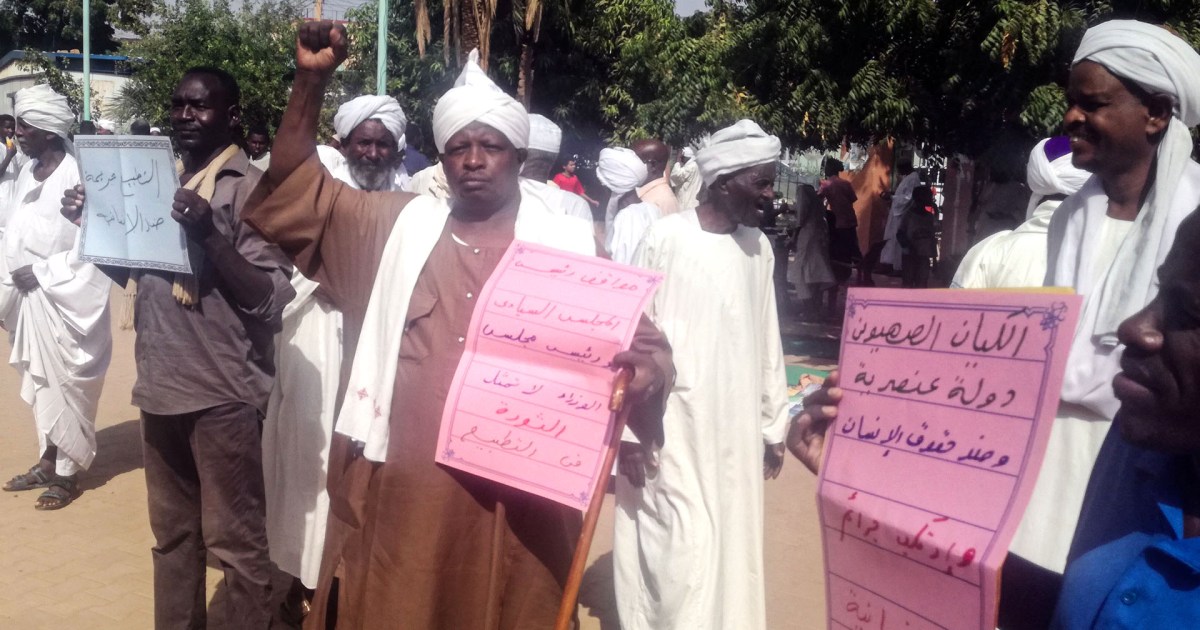Ahmed Fadl - Khartoum
The positions on normalization with Israel were contradictory on Friday's platforms between the West Bank of the Nile, which hosts the Ansar Mosque, the Umma Party, in Omdurman, and the East Bank, where the Al-Shaabiya Mosque in Khartoum North, reflecting the severity of the division over the issue.
As soon as the preacher and imam of Al-Ansar Mosque, Adam Ahmed Youssef, Deputy Secretary-General of the Ansar Affairs Authority, finished a sermon in which he criticized the steps of normalization with a "usurper Zionist state", protesters lined up outside the old mosque carrying banners condemning normalization.
Despite the small number of protesters, anger fills their wings, chanting slogans against normalization and against selling the country's national positions.
Taha Al-Bashir, a member of the leadership of the National Umma Party, addressed the protesters, saying that the party's leader, Sadiq Al-Mahdi, represented the party's masses and the sect.
On the other hand, the preacher and imam of the ancient Al-Sha`biyya neighborhood mosque in the city of Khartoum North showed remarkable support for normalization, and said that Sudan is not a heresy, as Palestine itself and Egypt have preceded it, and it also needs Israeli technology and secures America's strength.
A de facto situation
and the protest movement against normalization does not seem broad and consistent with Khartoum and its three loyalties following an Arab summit following the setback in 1967, which raised the slogan: "No reconciliation, no negotiation, nor recognition of Israel."
A social psychologist, Amir Mirghani, believes that the Sudanese have accepted normalization, and it has become a reality in the sense that the refusers are a limited group who are defeated.
He points out that the old perceptions that Israel is an enemy has no place among the young generations who made the December revolution with protests and barricades "because it is a segment of infidels in everything, and their view of Israel is different, and therefore there is no shame in normalization."
Mirghani says that the Sudanese on the social level coexisted in the past and currently coexists with Jewish families in the Al-Masalmah neighborhood in Omdurman without problems. Therefore, normalization is not a problem, but the problem is how to manage it.
A governmental monopoly.
The sociologist and education specialist Jamila Al-Jumabi believes that the Sudanese people are by nature in solidarity with the Palestinian cause, so the possibility of a large group of them accepting normalization is not an easy matter, and it has created a kind of hidden conflict and divergent views.
Al-Jamaabi tells Al-Jazeera Net that the normalization decision came in light of the excruciating economic conditions experienced by the Sudanese citizen, who when he accepts normalization, he is obliged and reluctantly.
The government's disgrace is to monopolize the normalization decision without conducting any referendum that accompanies the views of society in a fateful decision that requires national consensus and a union of visions, noting that experiences have shown that meta decisions are not beneficial to the individual and society, but rather to achieve an agenda related to staying in power.
And the sociologist advises that the opinion of groups that reject normalization be respected, regardless of their political or religious affiliations, because they have visions that deserve consideration, study and analysis.
A state of shock
and at the civil level, Bushra Al-Saim, from the civil administrations in northern Sudan, attributes the state of acceptance among the Sudanese to start relations with Israel to what he called a state of shock, because normalization is an unexpected event due to the large accumulations that Sudan has witnessed.
He points out that the simplicity of the Sudanese and their connection to livelihood more than politics and rights, which paved the way for the acceptance of normalization, which, according to his opinion, is economic exploitation as well as religious and Arab exploitation in opposition to normalization.
Al-Sayyim also tells Al-Jazeera Net that linking normalization with removing Sudan from the list of states sponsoring terrorism was intelligent, and increased the popular bias for normalization in pursuit of the desired interests of lifting US sanctions.
He considered the three no's as part of the past, and was justified at the time by the prevailing Arabist approach to Sudan. However, Sudan is now witnessing a resurgence of African nationalities in Darfur and the Jal Nuba and Blue Nile regions.
Accordingly, Al-Saim believes that the position on normalization should be governed by interests and the world's position on the issue related to accusing Israel of practicing apartheid, failure to comply with United Nations resolutions and the dispute over Jerusalem.
"The saying of throwing Israel into the sea and erasing it as a nation and a state has become illogical and is not accepted at this time."
The art of the possible
As for al-Tayyib Wad al-Makki, the official in charge of organization, culture and tourism in the northern entity that falls under the revolutionary front, he finds the art of the possible in politics, which requires dealing with the reality of "America is the world's policeman and Israel is its spoiled girl."
As a matter of interests, Wad al-Makki enters by saying that Israel possesses the technology we need in agriculture and industry in exchange for Sudan's airspace to cross its planes and invest in its resources.
And he stresses that the generations that made the revolution are indifferent to historical loads that "only brought to the country everything that meant and reality," explaining that normalization exposed the ideology that was invaded.
However, the foreign minister in charge, Omar Qamar al-Din, asserts that normalization at the popular level in Sudan needs a long time, inferring that the official normalization between Egypt and Israel, despite its age, is still missing at the popular level.
The minister said during a seminar in Khartoum on Thursday evening that normalization is a long journey and its level varies, and it is a "list from which you choose what you like and your interests."

